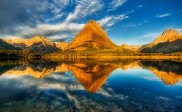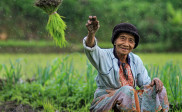How to Take Great Pictures in the Snow
Taking pictures in snowy landscapes can be challenging. It is very difficult to balance the camera’s internal color settings to achieve a well-exposed shot. When shooting outside in the snow without the correct setting photographers only get over-exposed shots. Here are some tips to help you shoot clear snowy pictures.
Use pre-shutter on a dark object
If your area is completely encompassed in snow, you can avoid over-exposure by focusing on a dark object — like a shadow — and press the shutter button halfway down. Your camera will keep from automatically resetting the auto white balance. You can then focus on the main subject. You should get a good shot with the pre-shutter exposure settings.
Turn down the exposure settings
Most cameras have an exposure setting. You should try turning down the exposure by one or two points. By purposely under-exposing your shot, you are compensating for the natural light reflections off the snow. Though this does not always work it is worth giving it a shot.

D2k6.es
Don’t shoot directly into the sun
As a general rule, make sure the sun is on either the right or the left side of the frame. However, this style rule is even more important for taking winter shots. During the winter season, the sun is especially bright. This is partly due to the sunlight reflecting off of the snow, but mostly because of the position of the sun during the winter.
Choose your time
The time of day you shoot has a large impact on the quality of your pictures. If you are shooting your pictures early in the morning, you’ll have better luck with the exposure and shadows; however, you will have many more reds in the picture. Of course, you can always color compensate in post-shot editing. If you shoot in the midday, you will deal with the over-exposure, but you will retain the natural blue hues associated with winter shots. Evening shots tend to be beautiful for winter shots with the sun setting, but like shooting in the morning you will still have to deal with the red hues.
Use fill flash
If it is unusually bright, you may have to use your camera’s fill flash setting to eliminate the dark shadows on your subject. If you don’t use it, your surroundings may be bright, but your subject will be dark. The fill flash can help take away that darkness.
It takes practice and a good eye for taking excellent winter photos. Over time, you will understand how the natural light plays off the snow. The more you shoot in the snow , the more tricks and techniques you will learn to help you keep a good balance of light and shadows in your photos.




It would have been nice to see more example. Do you know the only problem with taking photos in the snow? The snow. 🙂